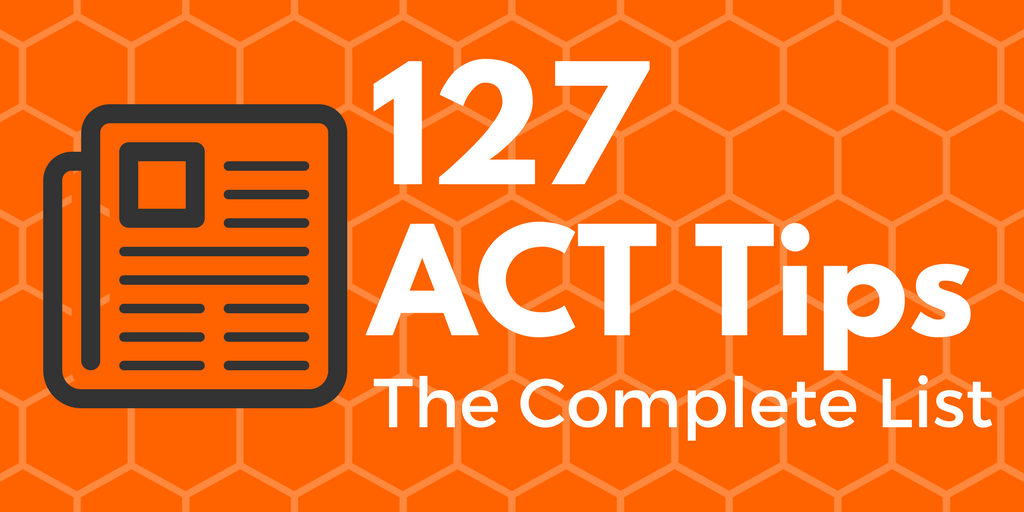
You can probably recall some of the most common ACT tips and test taking strategies…
But can you remember them all?
Well you are in for a surprise because I have put together the complete list.
Some are mandatory.
Some are unique.
Others are so good that some people try to hide their existence.
But they are all here.
Test Preparation Tips

1. Practice at the Edge of Your Abilities: Practice with problems that are not too easy or not too hard. If a question is too easy, then you are just wasting your time. If a question is too hard, then you become frustrated and are less likely to learn. Try to find that middle path.
2. Work on Your Weak Points Before Your Strong Points: You have a lot more to gain score-wise if you work on improving your weaknesses before your strengths. It may be tougher at the beginning, but by test time it will be worth it.
3. Practice All That You Can: Practice makes perfect and nothing will prepare you more for the exam than practicing example problems. By practicing all that you can you will be ready for whatever the test writers throw at you on test day.
4. Do at Least 1 Full Practice Test: Completing a full practice test is essential before taking the full ACT exam. Taking the practice test allows you to realize how draining the full test can be and how you can handle it in the future. Practice makes perfect.
5. Do Not Forget to Register by the Deadline: Do not make this often overlooked mistake! It would be a very frustrating day to show up for the exam and realize that you never completed your registration. A lot of study schedules make sure to end right before the exam to give the best results.
6. Try out a Test Preparation Class: A test preparation class can help a lot with getting a student motivated. Sometimes it can be tough to study for long periods. But if you are with other students and a teacher it can be a lot easier. A lot of these courses also give exclusive tips and practice problems. A win-win.
Here is our list of the best ACT prep courses.
7. Get Some Value out of Online Resources: There are a ton of online resources out on the web to use (like this one!). They are not of lesser quality just because they are free. A lot of times if you are stuck on a problem you can look up an exact solution online.
For an easy way to access these online resources for studying, see our list of the best laptops for college.
8. Know the Different Question Types on the Exam: The ACT exam has a lot of the same types of problems from test to test. Knowing these problems and how to solve them can give you a big leg up. It will also ease your nerves on test day because you will know what to expect.
9. Take Breaks Often: We all know that it can be pretty difficult to study for super long periods of time. Taking breaks will allow to you study for longer periods since you give you brain a chance to recharge. So don’t fret if you reward yourself with a late night snack run!
10. Turn off Your Phone During Study Time: Your phone can be a big distraction during study time. Put it away and focus on the problems at hand. You won’t be able to have your phone during the exam, so don’t use it during study time.
11. Learn How to Use Your Calculator Now: Your calculator can come in hand big time when taking the exam. Make sure that you are up to snuff with all of the fancy features and equations that are used in today’s calculators. Some are so good that you just plug in the question and it spits out the answer.
Here is our list of the best calculators for the ACT.
12. Make Sure That Your Calculator Is Permitted on the Exam: Some calculators are so powerful that they are banned from the exam. Make sure that your calculator is permitted for use on the exam. Most calculators with CAS functionality are banned from the exam.

13. Try to Simulate Normal Testing Conditions: Knowing what to expect on exam day is a big step towards realizing your true potential. Nothing can compare to real testing conditions, but trying to simulate them at home is the best alternative.
14. Try out Different Strategies for the Math Section Now: There are a lot of different ways to complete the common questions in the math section. Try to find your favorite solutions now so that you are not scatterbrained on exam day. Some solutions are better for certain students. So, find out your favorite ways today.
15. Diagnose What You Are Good at Early On: Having a good personal reflection on what your strengths and weaknesses are is essential to ACT success. Knowing yourself is the first step toward greatness. Work on your weaknesses and your whole education base will improve.
16. Teach the Concepts to Another Student: Teaching to someone else is one of the best ways to learn. It makes you think critically and allows you to think in a different way than if you were just learning. If you switch off with another student you can also learn some of their tricks of the trade.
17. Make Sure to Go Over Your Mistakes: Going over your mistakes is also one of the best ways to learn. Mistakes provide a glimpse into our imperfections, and allow us to better ourselves. Being able to understand what we have done wrong gives a better glimpse into common problem areas.
18. Execute a Study Schedule: A good study schedule is essential to ACT success. Make sure that your study time is not too light or too heavy. Most preparation experts say that you should study between 20 to 100 hours for the ACT. Try to split up that time between now and exam day.

19. Get a Test Preparation Book: A review book is one of the best ways to prepare for the exam. They usually provide a study schedule and ramping practice problems to make sure that you are always on the edge of your skill set. Luckily for you we have made a list of the best ACT prep books available.
Click here to see our list of the best ACT prep books.
20. Learn the Section Directions Now: The section directions do not change from ACT to ACT. Learn them now so that you are not wasting time reading them on exam day. Why waste precious time when you can learn it now?
21. Work on Problems Without a Calculator: A lot of math problems on the exam can be completed without a calculator. Sometimes using a calculator can actually waste time instead of save it. Practice without one now so that you can quickly recognize when it would be beneficial to go without one.
General Test Tips

22. Skip Any Questions That You Have No Clue On: Always be sure to answer the easy questions first. Getting the easy problems our of the way will allow you to save extra time for the tough questions at the end.
23. On Difficult Questions, Eliminate as Many Incorrect Choices as You Can: Sometimes a question can be pretty difficult. Make sure to eliminate to answer choices that you know are wrong before trying to tackle the question.
24. If You Have No Clue, Guess: On the ACT, there is no penalty for guessing. Always try to make sure that you leave an answer for every bubble even if you have no clue on the answer.
25. Don’t Flip Back and Forth in the Test Booklet: If you flip back and forth often between the test booklet, you are most likely skipping too many problems. Taking time to flip back and worth can really be wasteful. Try to do the questions in order unless you come upon one that is much too difficult.
26. Make Sure That You Place Your Answer in the Correct Section on the Answer Sheet: One of the worst things that you can do on the exam is to accidentally mark a question wrong or skip a space on the answer sheet. Skipping a space can waste a lot of time since you will need to correct all of the answers bubbled in afterwards too.
27. Do Scratch Work in the Test Booklet: Try to use your test booklet for scratch work instead of loose leaf paper. Your scratch work becomes for organized since it is natural to do the work next to the question in the booklet. You will not lose your place this way.
28. Underline the Important Parts of the Problems: To keep yourself focused, underline key parts of the problem while reading through the question. This will also allow you to quickly catch up if you end up skipping ahead.

29. Bubble Your Answers at the End of the Exam Period: Compartmentalizing your approach to the exam can help you to save time. Try to quickly mark your answers in the test booklet during the exam and then at the end transfer your answers over. This will save you time.
30. Don’t Change an Answer Unless You Are Sure It Is Wrong: Do not change an answer unless you are certain it is wrong. Your first instinct is usually incorrect plus it can be wasteful and risky to erase and answer and then to go back and change it again.
31. Combine Commonalities in Answer Choices to Guess Smart: Try to combine the different answer choices to pick the most common one. For example: if the choices are a. green cat, b. green dog, c. purple cat, d. orange owl, you should choose a. green cat since it is the most common with the other choices.
32. Try Covering up the Answer Choices: A good trick to use is to cover up the answer choices and come up with your own answers. Once you decide on a choice, reveal the answer choices and pick the one that matches closest to your guess.
33. Use All of Your Extra Time Wisely: The ACT is geared a lot towards completing the test quickly. Use your extra time wisely to go over tough questions and to make sure you did no make any mistakes.
34. Every Question on the ACT Is Worth the Same: Even though there are hard questions and tough questions, every problem on the ACT is worth the same. Do not waste your time on a hard question if you can get the same benefit by completing an easy one.
35. Read the Words in the Question Carefully: Sometimes the test makers will try to throw a curveball at you. Make sure that you do not slip up by reading the questions carefully all the way through.
36. Avoid Stray Smudges on Your Answer Sheet: The ACT answer sheets are graded by computer, not by hand. A computer cannot decide between a smudge and a real answer choice. Make sure that your marks are clear.
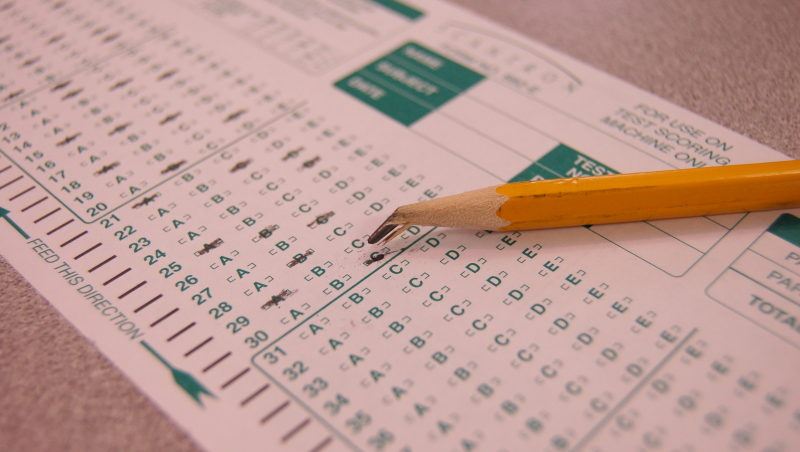
37. Pace Yourself: The ACT is a long and difficult exam. Make sure to pace yourself so that you do not wear yourself out. It would suck to start out so well, but then taper off at the end because your brain is fried.
38. There Is One Correct Answer for Each Question: There is only one correct answer for each problem. If the question is a tough one, make sure that you can eliminate all of the wrong answer choices too.
39. Answer the Easy Problems First: Spend all of your time at the beginning of a section answering all of the hard questions. Since easy and hard problems are worth the same amount, it is a good idea to get all of the easy ones done first.
40. Pay Attention to the 5 Minutes Remaining Announcement: The 5 minutes remaining announcement is crucial to your success on the ACT. Use this announcement to start filling in all of your answers on the test sheet. If you have not started a question, start guessing.
41. Don’t Spend Too Much Time on Any 1 Question: Getting bogged down on one question can really lead you to miss opportunities on others. If a question is proving too difficult, move on to another problem.
English Section Tips

42. Try to Complete the Sentences With Words That Make Sense to You First: Fill in the blanks on sentence completion questions with words that you think of yourself. Then try to choose the answer that best matches yours from the choices.
43. Remember Run-On Sentences: It can be easy to forget that a run on sentence is a possible incorrect sentence structure while you are taking the exam. Keep this in the back of your mind while making sentence corrections.
44. Be Aware of the Different Common Prefixes and Suffixes: Knowing different prefixes and suffixes is essential to being able to figure out unknown words. The beginning and ends of words give a lot of clues to their meaning.
45. Simplify Complicated Sentences: It can be easy to get bogged down in convoluted sentences. Try to simplify the sentences to make them to make them easier on yourself. This will allow you to see the true sentence structure and meaning.
46. Dispose of Duplicate Answers: Sometimes the test writers will try to trick you by giving answer options that are very similar to each other. Usually if 2 answer choices are too similar, they are both wrong. So eliminate both.
47. Do Not Rush Your Answer Selection: Rushing through your answers is a quick way to get a bad score. Make sure that you think critically about the answers you have chosen and that they are marked in the correct location on your answer sheet.
48. Reread the Sentence Using Your Selected Answer: A good trick to use is to reread the sentence with your selected answer choice. Things will quickly become clear if your answer sounds wrong in context.
49. Do Not Focus a Lot on Studying for Vocab: The ACT no longer emphasizes knowing your vocabulary. Most entrance exams now put a focus on students being able to learn vocab from context.
50. Use the Context Given by Nearby Words to Figure out Unknown Words: An easy way to figure out a meaning of a word that you do not know is to use the context of nearby words. Use these clues to decipher the meaning of unknown words.
51. Try to Answer the Problems as You Read: Answering problems as you read is a simple way to save time on the exam. You get the context and location of questions without trying to skip back and forth, wasting time.

52. Do a Quick Review of Uncommon Punctuation: An easy way to slip up on the exam is to not remember uncommon punctuation like semicolons and colons. The test writers love to throw these into sentences to throw you off.
53. Be Careful With No Change Answers: If you find yourself answering every problem with “no change”, you may want to rethink your strategy. Normally, less than 10% of answers will be “no change”. Don’t always take the easy way out.
54. Do Not Overlook the Reversing Effect of Negative Words and Prefixes: Negative words and prefixes can have a drastic effect on the meaning of words. Make sure to take them into consideration.
55. When in Doubt, Try to Choose the Most Concise Answer: The most concise answer is often the correct answer. Say what you need to say in more words is not the most precise. SO try to pick the most succinct answer.
56. Let the Transition Words Lead You to the Best Answer: Sentence transition words like however and likewise allow you to infer the meaning of a sentence from the previous one. Use this to your advantage.
57. For Unknown Words, Try to Think of Words That Have Similar Prefixes, Roots or Suffixes: There will be a lot of words that you do not know on the ACT. Try to use common words roots to figure out their meanings.
Math Section Tips

58. Make Sure That Your Answer Is Reasonable: Always double check and make sure that your solution at least makes sense. Is your number way too big or too small with what you are dealing with?
59. Try Substituting Answer Choices Into the Problem: An easy trick to try is to substitute each answer choice into the problem. This is especially useful on algebra problems with variables where you can use the answer choices for the guess and check technique.
60. Do Not Depend on Your Calculator: Using your calculator sometimes has its advantages and disadvantages. It can really help to speed you up on hard questions, but it can also really slow you down on easy ones. Be careful.
61. Do Not Get Carried Away With Overly Detailed Calculations: Stop yourself if you think that you are making a solution harder than it actually is. Skip ahead and come back to get a fresh perspective.
62. Learn All of the Important Formulas, Definitions and Concepts: Unlike the SAT, the ACT does not give you needed math formulas. Try to remember common formulas like areas and volumes of shapes and the Pythagorean theorem.
63. Use the Test Booklet for Scratch Work and Drawings: You can write in your test booklet, so use it. Writing in your test booklet also allows you to keep your work organized with the problems. No more fumbling through loose leaf if you need to come back to a question.
64. Draw Pictures: Being able to picture a problem is half the battle. If a slope or a graph is needed, a great way to visualize it is to draw it out. Visualization can really allow difficult problems to become more clear.
65. Don’t Ignore the Diagrams: The diagrams can sometimes be easy to ignore. Do not do that. Diagrams can really help you to picture a problem, or see the question at hand more clearly.
66. Review SOH CAH TOA: The ACT loves to ask questions about triangles and their side lengths and angles. Make sure to review SOH CAH TOA and how to tackle these types of questions. Your calculator may have an easy way to finish them.
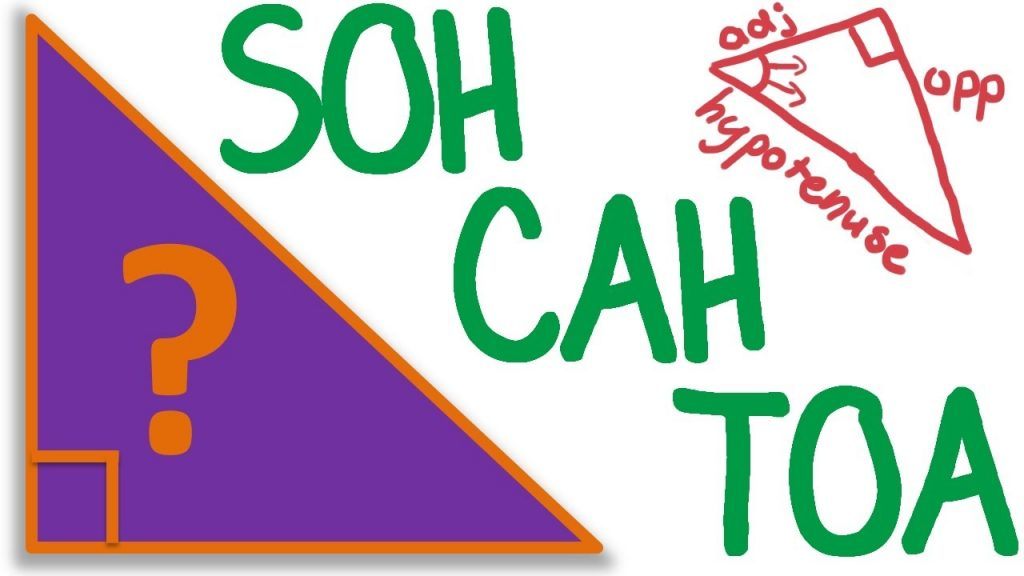
67. Read Every Question Carefully: The math section, unlike any other, will try to trip you up with convoluted questions. Make sure that you understand the question at hand before you use precious time trying to figure out the answer.
68. Work With the Smallest Numbers Possible: It is a lot easier to multiply 12×9 than it is to multiply 1200×900. Use the smallest numbers possible that make a problem easy and then add back the zeros.
69. Remember the Order of Difficulty: The questions in the math section normally go from easy to hard. Try to get through the easy questions quickly so that you have extra time for the more difficult ones at the end.
70. Substitute Numbers Like 0 and 1 for Variables: Substituting a 0 or a 1 really allows you to see how certain functions behave under certain conditions. If appropriate, you can also substitute negative numbers.
Reading Section Tips

71. Answer Familiar Questions Before Unfamiliar Ones: Answering questions that you are familiar with first is crucial. Your short term memory starts to fade quickly after you get done reading. Make sure to answer those questions that you remember first so that you do not need to waste extra time looking up answers that you previously knew.
72. The First and Last Sentences of Each Paragraph Are Critical: The first and last sentences of each paragraph should give the overall greater meaning to the words contained within. The ACT asks a lot of questions about overall and encompassing meanings.
73. Remember to Read Actively: Reading actively allows you to remember more about what you have read and makes you think critically. Thinking critically makes you more focused on the meaning of what is being read. It helps to prevent those frustrating moments when your eyes scan over the words, but you autopilot the reading, forgetting what you had just read.
74. For Passage Pairs, Read the Introduction: It can be really easy to skip reading the introduction to the passages since they look like directions. For passage pairs in particular, the introduction gives a lot of crucial detail on how the 2 passages are connected and how you should go about reading them.
75. Read the Questions Quickly Before the Passage: Make sure to skim through the questions quickly before reading the passages. This will allow you to mark a section of the passage when you think that it pertains to a question. This little trick will save you some time when you try to refind your place within the passage.

76. Do Not Waste Your Time Trying to Memorize the Details: The ACT very rarely asks about specific sections in a passage. They are much more likely to ask about overall and encompassing questions about the meaning of paragraphs or the whole passage, whether the author is for or against a certain opinion, etc.
77. You Should Base Your Answers Solely on the Information in the Passages: Do not try to interject outside facts or details from outside of the passage. If the passage is about something that you have studied outside of the exam, do not use that information on the test.
78. Spend More Time on the Questions Than the Passages: Reading the questions thoroughly and making sure that you understand them is super important. Try to spend more time on the questions and reading them than you do on the passages.
79. Do Not Ignore the Passage Introductions: The passage introductions are easy to skip, but don’t. Passage introductions give essential information like background info and other crucial details of the passage that you should not ignore.
80. Do Not Take Too Many Notes: Taking notes is a good thing to do during the test, but do not over do it. Wasting time taking notes on things that you do not need to know can be detrimental to your score. Make sure that your note taking is concise and quick.
Science Section Tips

81. Rely on the Visual Graphs and Drawings: The visual graphics and drawings really help to paint a clearer picture. Sometimes it can be easy to ignore them and just read the questions, but make sure to fully grasp the figures and graphs.
82. Do Not Get Stuck on the Big Science Words: The ACT tries to trick test takers with big and confusing science words. These words distract you away from the rest of the question and make you waste your time. Most of the time the meaning does not even matter. Just ignore them and answer the question without it.
83. Read the Questions Before Looking at the Passages/Graphs: Reading the questions before looking at the passages and graphs allows you to key in on what really matters when you do look at them. A lot of the time there will be more information than you will really need, so knowing what you need to look for allows you to avoid the fluff.
84. Complete the Conflicting Viewpoints Section Last: The conflicting viewpoints section usually requires the most thought and time, plus it can sometimes be frustrating. Leave this section last to save time for the easier sections. Since all questions are worth the same it is better to leave the hard ones for last in case you are unable to finish.
85. Make Sure That You Read the Right Figure and Read the Labels: It can sometimes be really easy to match the wrong figure with a question. When this happens it can become really confusing, wasting you precious time. Always make sure to read the figure and graph labels.
86. Note and Relationships Between the Variables and Trends Represented in the Charts and Graphs: A lot of question on the ACT correspond with how the variables are trending on a graph. When looking at a figure try to make up a small story from what you are seeing.
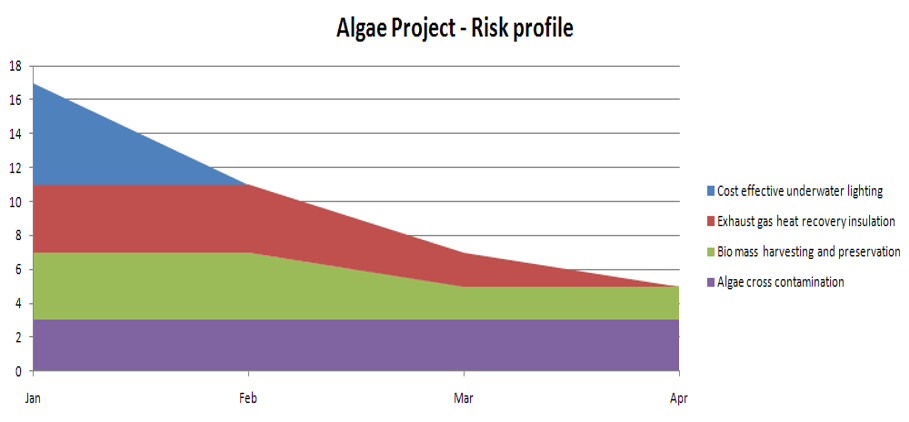
87. Note the Conflicting Viewpoints in Some Passages: Questions in the ACT science section sometimes ask about opinions and viewpoints of the science passage authors. Make sure to note if 2 authors have conflicting viewpoints. This will most likely be featured in the questions.
88. Know the Commonly Used Science Terms: Most science terms can usually be ignored on the exam, but some of the common ones are crucial. Terms like absolute zero, independent variable and acceleration are crucial to know. Look up a list on Google to make sure that you know all of the common phrases on the test.
Essay Section Tips

89. Analyze and Then Write: Make sure that you analyze and make an outline before you write. It can be time consuming to rewrite or erase whole paragraphs. Plus, smudges and erase marks don’t leave a good first impression for the graders.
90. Break Your Time up Into the Different Writing Steps: Having a process and flow for your writing makes it a whole lot easier. Write an outline, form your opinions, and then begin writing. Getting into this natural flow allows ideas and incites to come out onto the paper easier.
91. Only Use Information From the Passages: The essay readers do not care about other facts or opinions that are not from the passages. Make sure that you base your essay off of the information given to you, and not outside sources.
92. Make Sure That Your Concluding Paragraph Summarizes Your Viewpoints: Your concluding paragraph should go over each of your arguments and summarize your viewpoints. This is standard essay format and should be followed on the ACT.
93. Keep Your Writing Style Simple: Keep your writing style simple. Do not try to impress the graders with words that you do not know well. Write within your means and make sure that you do not make any mistakes. It is easy to catch a mistake, but hard to be convinced that someone is perfect.
94. Avoid Slang at All Costs: Slang stands out like a sore thumb and something that can really distract an ACT reader. Keep slang to a minimum and focus on making good arguments and keeping your essay error free.

95. Use Specific Evidence From the Passages: Use specific evidence from the passages to back up your arguments. Even go as far as to quote the passage in your essay. The readers are looking for specific mentions of sections in the passage that they know are good for backing up an argument.
96. Use the Prewriting Questions to Your Advantage: The ACT will give you some prewriting questions to get your mind thinking about the topic. Try to include the answers to these questions in your essay. It may be something that the readers are looking for.
97. Keep the Structure of an Essay in Mind: Remember than normal essay format has an introduction paragraph, some body paragraphs, usually 1 for each argument, and a concluding paragraph. This type of structure allows the essay reader to follow along a lot easier. Since the readers have to read so quickly, trying to mix it up can leave them confused.
98. Make Sure That Your Introduction Paragraph States Your Position That You Are Taking: Your introduction paragraph should clearly state which position you are taking and your viewpoint on the topic. This is the main reason for the introductory paragraph.
99. Do Not Skip Lines or Write in the Margins: Skipping lines or writing in the margins can possibly be bad for your essay score. When lines are skipped this leaves less room for the actual essay. And writing in the margins can sometimes look like you have rushed or can confuse the essay readers.
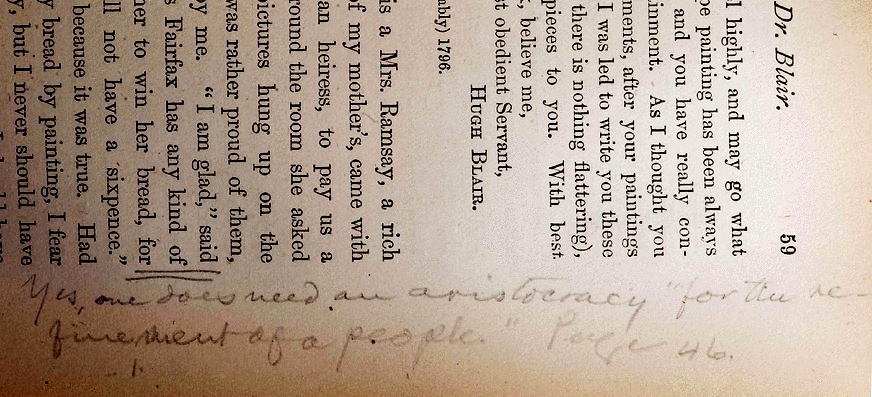
100. Try to Write a Longer Essay: Studies have shown that longer essays correspond to higher essay scores. Longer essays allow you to scope out your viewpoints more and make better, and more thoughtful arguments. Try to use the full allotted time for your essay.
101. Your Body Paragraphs Should Expand on Your Introductory Points: Make sure that your body paragraphs are well thought out and organized. They should expand on the points that you make in your introduction. State your viewpoints first, then back them up.
102. Do Not Tell the Readers Your Opinion: The essay readers do not care your personal opinions or thoughts on a topic. They want to be presented with facts and for you to back those facts up with examples from the passages. Being able to do this will guarantee a high score.
103. Avoid Wordiness at All Costs: Your writing should be concise and to the point. Do not write words just to make your essay longer. Every sentence should have a purpose in your essay. If you have any doubt, then just throw it out.
104. Use Creative Sentence Transitions: Reading essays can sometimes become monotonous and boring. Make sure that every sentence does not begin with the same word. Mix up your sentence styles to entertain the reader and keep them interested in what you have to say.
105. Be Aware of the Passage Writing Style: If the author of the passage is positive or negative in tone, make sure to write that down. Sometimes it may not be as clear in the middle of a passage, but the beginning or end of a passage really give away the tone of a writer.
Night Before and Day Of Tips

106. Get a Good Night’s Rest: Getting a good nights sleep is essential to being 100% on test day. Make sure that you go to bed early and that you are not disturbed during the night.
107. Do Not Bring Your Cell Phone: Cell phones are not allowed to ring in the exam room. So just do not bring one. Tell your ride to pick you up when the exam is scheduled to end. Easy as that.
108. Make Sure That Your Calculator Is Charged/Has Fresh Batteries: Running out of juice on your calculator is one of the most frustrating things that can happen to you on exam day. Make sure that your calculator is charged or has fresh batteries.
109. Bring a Fresh Eraser: Make sure that your eraser is in good working condition. A lot of erasers on pencils these days are not very good and leave smudges in their wake. If you need to erase, it need to be smudge free.
110. Go to the Bathroom Before the Beginning of the Exam: Make sure that your bladder is empty before the exam begins. having to go during the exam can be very distracting, making your mind wander and lowering your score.
111. Avoid Screen Time the Night Before: Blue light that comes from electronic screens like TVs, monitors and cell phones has been show to keep us up later at night. Avoid screen time before bed to avoid not being able to go to sleep.
112. Create a Plan to Get to the Testing Location: Make sure that you can get to the testing location quickly and efficiently. Sometimes the location may be somewhere that you have never been before. Make sure to drive by to learn your way there.
113. Sit in a Front Corner Spot in the Exam Room: Distractions can come from all angles, so why not eliminate some of them? Sitting at the front eliminates distractions from in front of you. And sitting in a corner eliminates distractions from one side.
114. Have a Good, Healthy Breakfast: Having a good breakfast gives you enough energy for a healthy and productive day. Breakfast is the most important meal of the day, and the one that matters most on test day.

115. Bring a Snack: Even if you have a good, hearty breakfast, you may still get hungry during the exam. Make sure to bring a snack in case this happens. Normally snacks are not allowed to be eaten in the exam room, but they are allowed during breaks.
116. Get to the Testing Location Early: To make sure that there is nothing to ruin your day on exam day, get to the testing location early. Traffic and other issues can give you a good scare the morning of the exam. Getting to the location early removes all of this stress.
117. Bring a Watch: The testing location is not guaranteed to have a working clock. Bring a watch so that you can pace yourself and so that you know how much time is remaining in each section.
118. Remember Your Body Language and Posture: Body language and posture can have a large effect on your overall mood and alertness. Stand and sit up straight to make yourself more alert and focused. Slouching can make you tired and sleepy, hurting your score.
119. Bring a Drink: Sometimes you can get thirsty during the exam. Water is usually a good bet, but something like Gatorade is even better. Bring a drink along just in case.
120. Do Not Forget Your Calculator: One of the worst things that you can forget to bring to the exam is your calculator. It is not a normal item to bring with you when you go out, so it can be easy to forget.
121. Steer Clear of Nervous People at the Test Center: Being near others can our nervous or anxious can really rub off. Make sure to steer clear of others that are not confident on exam day. Confidence is contagious, so catch some.
122. Do Not Cram the Night Before: Cramming the night before exam day can cause you to stay up late and fry your brain. Try to take a light day the night before so that you can relax and be ready for exam day.
123. Remember Your ACT Admission Ticket: This is an essential item, do not forget it!
124. Bring More Than One Pencil: Sometimes pencils can break or write or mark horribly. Make sure to bring extras in case your first one goes bad.

125. Put on Some Layers: The testing center can either be very cold, or very warm. Make sure to put on a layer so that you can keep it on if it is cold, or take it off if it is warm. It is a lot easier to work and concentrate if you are comfortable.
126. Remember Your Photo ID: The testing center needs to confirm who you are. Do not forget your ID!
127. Try to Pack Your Things the Night Before: Make sure that you have everything ready to go the night before. It would really suck to be late to the exam because you misplaced your calculator or ID and could not find it.
Have Any Other Tips?
If you happen to have or know any other tips not mentioned here, please leave them in the comments below.
I hope to update this list from time to time in the future with new tips and test taking strategies that the readers think up.
ACT Tips: Reviewed
| ACT Section | # of Tips | |
| 1 | Reading | 10 |
| 2 | English/Essay | 33 |
| 3 | Math | 13 |
| 4 | Science | 8 |
| 5 | General | 63 |
I like how you mentioned that completing a full ACT practice test will help you realize how the test actually is. My son is worried about taking the ACT test and I want to help him prepare for it the best I can. I’ll be sure to let him take a full ACT practice test and make sure he focuses on areas where he struggles.
that’s so good of you trying to help your son